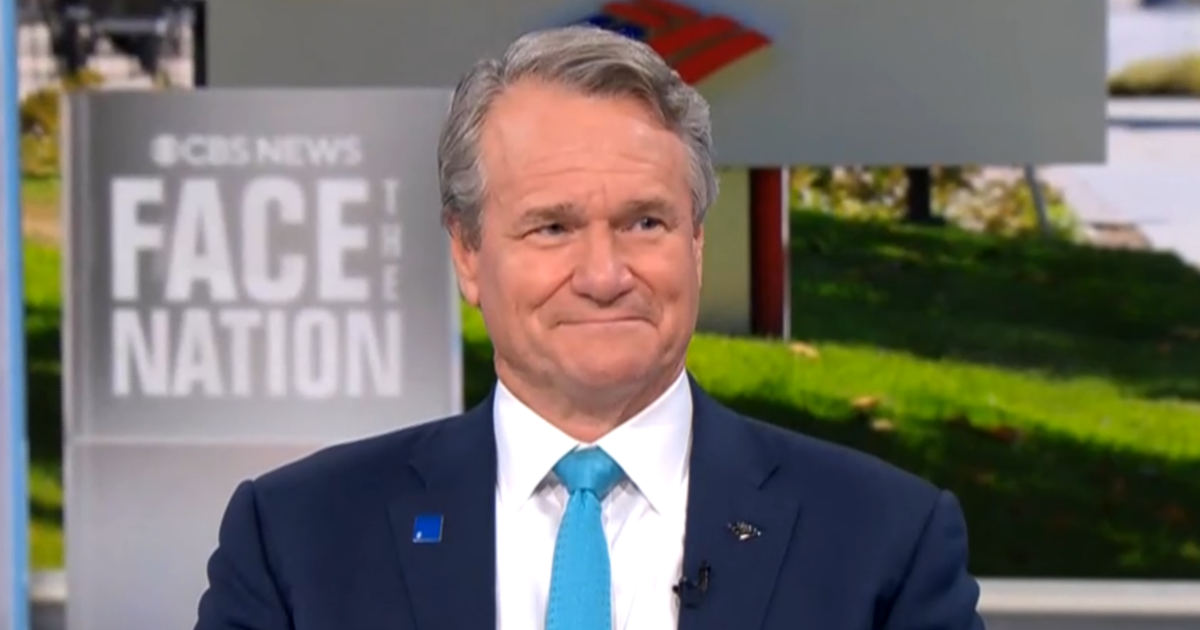

The following is the transcript of an interview with Bank of America CEO Brian Moynihan that aired on "Face the Nation with Margaret Brennan" on Aug. 3, 2025.
MARGARET BRENNAN: And we're back with Bank of America CEO, Brian Moynihan, good morning, and thank you for being here with us.
BRIAN MOYNIHAN: Good to be here again, Margaret, hope you're doing well.
MARGARET BRENNAN: Well, I'm hoping you can give us some clarity here on what's going on with the economy. Your Bank of America economists say no rate hikes this year and no recession. Is that still the case after Friday's jobs report?
BRIAN MOYNIHAN: Yeah, it's still the case, and that's a—less growth than they would have had six, nine months ago, and reflects the impact of the tariff war and the trade and all that—but they still think we continue to grow. And we're growing at a slow rate, say, one and a half percent this year, little more next year, and a little more the year after that. But it will take inflation—for the Fed to get inflation out of the system, really through the end of '26 into '27 down to the 2% level. And that's why they have the Fed holding. What they believe is sort of in the middle of next year, the Fed will start cutting and bring the Fed funds rate closer to what would be a more normal rate, around three percent, three and a half percent.
MARGARET BRENNAN: Even though we saw this, really, kind of astounding dissent by two members of the Fed saying, we do need to move on interest rates. Your prediction from your economists is that that's not appropriate at this time.
BRIAN MOYNIHAN: They don't think it's—they're going to move. Now, the market says they're going to move in September, maybe twice this year. The market was at seven times one point this year. Now they're down to two—then they're down to one, now they're up to two. This is going to move around, but the reality is, two things people should really keep in focus. One is, until the inflation is out of the system, the Fed is going to be a little—very careful, and that's what they said. And then secondly, the rate we're going to go to is a rate that is more normal than pre-global financial crisis, more of a 3%, 3.5% percent rate, which actually means the American economy is probably functioning better, frankly.
MARGARET BRENNAN: So on that point, the Wall Street Journal, we were reading in, puts the tariff tax increase as costing $360 billion a year. That's one of the largest tax increases in history, they say. Do you believe the administration's arguments that it's really only foreigners who are going to pay the cost of this. Do you think economists are overstating the negative impact?
BRIAN MOYNIHAN: Well, I think no one really knows, honestly, because this is a different regime than we've been in before. And there's- so they're trying to extrapolate from things from 50 years ago, when economies were different structured. Our team thinks it's- has an impact on inflation of about a, you know, 30, 40 basis points—
MARGARET BRENNAN: Meaning adding to prices people are paying.
BRIAN MOYNIHAN: Yeah, adding to the inflation rate in the United States. But we need to back up. What the real impact right now is the new Trump administration coming in had four or five policy areas they were really going to go after, having learned in the four years, they had to move very quickly. Those were around trades and tariff, immigration and taxation and deregulation. What businesses, and I just was in the Midwest with a bunch of businesses, they're all trying to do is figure out what the answer will be so they can go ahead and make their plans for '26. So the activity that's slowed down has more to do with people just trying to figure out the answer. It doesn't mean every answer is acceptable. Most answers are. So what do they have answers on? Obviously, a tax bill getting done. That's a good answer for business, because it makes the rates permanent. What's the second thing they have an answer on. They have an answer now on the range of trade possibilities. And so as they think about the trade possibilities, they sit there and say, tariffs might not be worse than x. They see some deals getting done, all of which is good work. What they don't have an answer on is deregulation. Yes, new regulations stop, but they are hoping for more deregulation, so that will help their business models going forward. And then the last is immigration. What will immigration really settle in like. And that's what they tell us. So they're not using their lines of credit, they're not- the indications from them are they're being a little more cautious, really waiting for some answers.
MARGARET BRENNAN: Businesses aren't hiring, either, we saw in this jobs data on Friday, that was the worst three months for job growth since the pandemic. Your firm, when I was reading the analysis, points to a number of different factors, and one of them is artificial intelligence and the adoption of that impacting hiring. How dramatically is it reshaping the job market?
BRIAN MOYNIHAN: I think this is sort of a question of almost a glass half full, half empty type of thing. So the impact—
MARGARET BRENNAN: No pun intended.
BRIAN MOYNIHAN: Exactly, sorry about that. But the impact of technology on human work content as a percentage of productivity has been huge. In our company- in 2010 when I started with the management team, we had 285,000 people. We have 212,000 people today. That was the impact of technology. We're bigger, more customers, more transactions, more reports to the government, more data, et cetera. So the impact has always been huge. AI gives you a place to go that we've never been able to go before. In other words, they're jobs that take text, think about it, and produce it. Many, many jobs in a company. Our research team, now you're able to maybe use a machine to enhance that activity. So we believe that people harness AI for their benefit are going to be very successful. My teammates who harness AI for their benefit are very successful. It's nervous making for young kids now, saying, will the jobs be there for me?
MARGARET BRENNAN: Right.
BRIAN MOYNIHAN: Then I say, look back historically. America has a lot more people working here. And think about the amount of technology came in over the last 50 years, and we have twice as many people work in this country as we did 50 years ago, twice as many, and the population has only gone up by about a third. So think about that dynamic as it finds its way through. That's the glass half full part of it. But it will have an impact. I don't think it's impacting a lot right now, because many companies are just trying to learn how to use it. Technology has impacted, and AI gives it a place to go it hasn't gone so far.
MARGARET BRENNAN: So we're talking about all the unknowns and why it's kind of hard to model things right now. Well, Friday, the President fired, as you know, the head statistician that comes up with these jobs numbers and presents them to the public. The former head during the first Trump administration came out in her defense and said this is- this is without merit, and it undermines credibility of data. Are you concerned by this firing, and do you feel there is political pressure here?
BRIAN MOYNIHAN: Well, I think that's more politics. And I know I'm in Washington, DC, and that's what we're supposed to talk about--
[CROSSTALK]
MARGARET BRENNAN: Government data is, is—
BRIAN MOYNIHAN: but the reality is, the data—
MARGARET BRENNAN: hugely important modeling
BRIAN MOYNIHAN: It's 2025
MARGARET BRENNAN: as you know.
[END CROSSTALK]
BRIAN MOYNIHAN: It's 2025 and the data should be able to be— they use surveys and things like that, which, frankly, just aren't as effective anymore. So if you look at the rate of people who respond to their surveys, it's down from 60% level to 50% level. You know, we don't use surveys (unintelligible) we do. We watch what consumers really do. We watch what businesses really do. They can get this data, I think, other ways and I think that's where the focus ought to be. How do we get the data to be more resilient and more predictable and more understandable? Because what bounces around is restatements, and that was one of the largest restatements, going back five or seven years in the pandemic, five years in the pandemic, that creates doubt around it. And so I think the key is, let's get- let's spend some money. Let's bring the information together. Let's find where else in the government money is reported. We report millions and millions of data points to the government every day. The data is out there somewhere.
MARGARET BRENNAN: Finally, back in January, you were at Davos, President Trump talked about Bank of America.
TRUMP ON TAPE: Many conservatives complained that the banks are not allowing them to do business within the bank, and that included a place called Bank of America. This conservative- They don't take conservative business. And I don't know if the regulators mandated that because of Biden or what.
MARGARET BRENNAN: Do you want to respond to the allegation that conservatives are not being allowed to do business with your bank?
BRIAN MOYNIHAN: We have 70 million consumers, and we're the biggest small business lender. That's not- the issue they're focused on is the regulators impact on this industry. And you heard Senator Scott talk about this this week. This reputation, this after the fact, look, that you banked x, and now after the fact, you're gonna say x didn't turn out to be what you thought. So we look at it. We look at it based on risk. People may feel those decisions are made for some other reason, but we always make it on what's best for our company, what's best for our client.
MARGARET BRENNAN: Are there industries you're uncomfortable doing business with?
BRIAN MOYNIHAN: No, we do business with really--
MARGARET BRENNAN: Guns, oil and gas, tobacco, all of it?
BRIAN MOYNIHAN: We do business with all those industries. Individual companies because of credit decision stuff, that's different. But the reality is, is that if they gave us clarity from the regulatory thing and avoid the second guessing, that would be helpful, and I think that's what the President was pointing out, if you listen to him.
MARGARET BRENNAN: All right. Brian Moynihan, thank you for giving us some insight into the data you are seeing. Face the Nation will be back in a moment. Stay with us.









-3.png)



